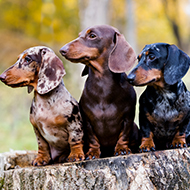New health screening scheme for dachshunds

The scheme is available for all varieties of dachshund.
The Kennel Club hasannounced a new health screening scheme to detect intervertebral disc disease (IVDD) in dachshunds.
The scheme is based on the existing Dachshund Breed Council IVDD screening programme and evidence from Scandinavia, which shows the risk of IVDD links to the number of intervertebral disc calcifications identified by x-rays in dogs.
Under the scheme, participating practices can submit x-rays from dachsunds of all varieties for subsequent scoring by an IVDD scheme 'scrutineer'.
Scrutineers are neurology experts that use a pre-defined protocol to grade the dog from zero to three, depending on the number of calcifications present in the spine. The higher the number of calcifications found, the more at risk a dog is of developing clinical signs and passing the disease on to offspring.
Following the screening, breeders will be supported by guidance explaining the grade their dogs have received and the health risk of potential matings.
Screening results will be available for the Dachshund Breed Council for publication, breed records and public information. The findings will also be made available via The Kennel Club Health Test Results Finder and the Breed Record Supplement in 2022.
Bill Lambert, Health, welfare and breeder services executive at The Kennel Club, said: “The growing demand for dachshunds from the everyday puppy buyer, combined with the already recognised health problems, means that the scheme is absolutely vital and we really urge breeders to make use of this tool and take advantage of the subsidies on offer when it launches.”
IVDD is the result of a gradual deterioration of the intervertebral discs that, in dachshunds, can happen at a much earlier age compared to other breeds. The calcification of these discs means they don’t absorb shock as well and can lead to disc herniation and spinal cord compression.
The Kennel Club is offering a £100 subsidy for the owners of dogs that participate in the scheme during 2021. For more information, visit kennelclub.org.uk



 The Veterinary Medicines Directorate (VMD) is inviting applications from veterinary students to attend a one-week extramural studies (EMS) placement in July 2026.
The Veterinary Medicines Directorate (VMD) is inviting applications from veterinary students to attend a one-week extramural studies (EMS) placement in July 2026.